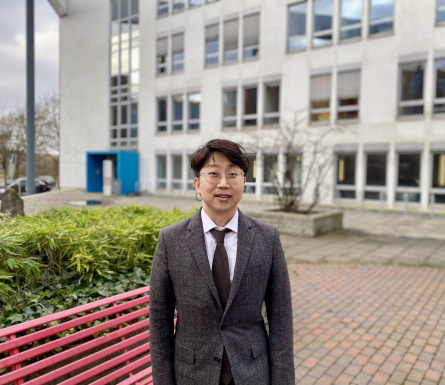
Dr. Jun-gi Heo, researcher at the GwangJu Public Agency for Social Service (PASS) in South Korea, gave a talk as part of the CRC 1342 Jour Fixe lecture series on Wednesday, January 23. Key questions were: What determines the progress of disability policy? How can social rights be strengthened within disability policy? Heo presented the two case studies of South Korea and Brazil.
Jun-gi presented a part of his Ph.D. dissertation whose guiding research questions are: 1) Is social rights expansion occurring in disability policy? How is the relationship between the social model and the previous medical model changing? 2) To what extent do policy ideas influence the formation of disability policy? Through which actor dynamics can this diffusion be explained? Using a theoretical framework combining policy diffusion with historical institutionalism, he explained the diffusion of the social rights for a disability policy to South Korea and Brazil.
In South Korea, it was the government that initiated the process of adopting ‘the First Comprehensive Plan for Disability Policy’ under the influence of the UN Economic and Social Commission for Asia and the Pacific (ESCAP)’s call for long-term strategies and national action plans for disability policy. It was mainly guided by the government’s legitimacy-seeking motivation, whose leader, the president, wanted to demonstrate his deservingness of receiving the ‘Roosevelt International Disability Rights Award.’ Consequently, the contents of the comprehensive plan were mere extensions of existing disability policy, far from the social rights, which was the global social policy trend back then. However, after the establishment of the first plan, as the disability movement increasingly took part in the policy-making process, the idea of social rights that they learned from foreign countries began to shape disability policies. By contacting the presidential office, legislators, and electoral candidates, the disability movement groups tried to have their advocated ideas adopted. Although there were conflicts between existing institutions and internationally diffused ideas, revealed in the form of layering or conversion, consistent pressure from international organizations and domestic actors made the coupling of a formal plan and actual implementation of an idea possible. He added that although he hasn’t studied a Brazilian case in depth yet, similar diffusion dynamics were observed when Brazilian disability policy adopted the social rights by introducing Politica Nacional de Assistencia Social and the Unified Social Assistance System.
Jun-gi Heo is a researcher at the GwangJu Public Agency for Social Service (PASS), South Korea. His academic interests primarily focus on Korean disability policy. For his doctoral dissertation, he explored the formation and evolution of Korean disability policy by integrating policy diffusion and historical institutionalism. Driven by a commitment to inclusive research, he strives to infuse his work with the perspective of people with disabilities. This endeavor is particularly challenging yet personally significant for him as a blind individual. Consequently, he also delves into the study of disabled identity, welfare states, and social policy research from a disability perspective.
Contact:
Migyeong Yun
CRC 1342: Global Dynamics of Social Policy
Mary-Somerville-Straße 3
28359 Bremen
Phone: +49 421 218-58637
E-Mail: migyeong@uni-bremen.de













